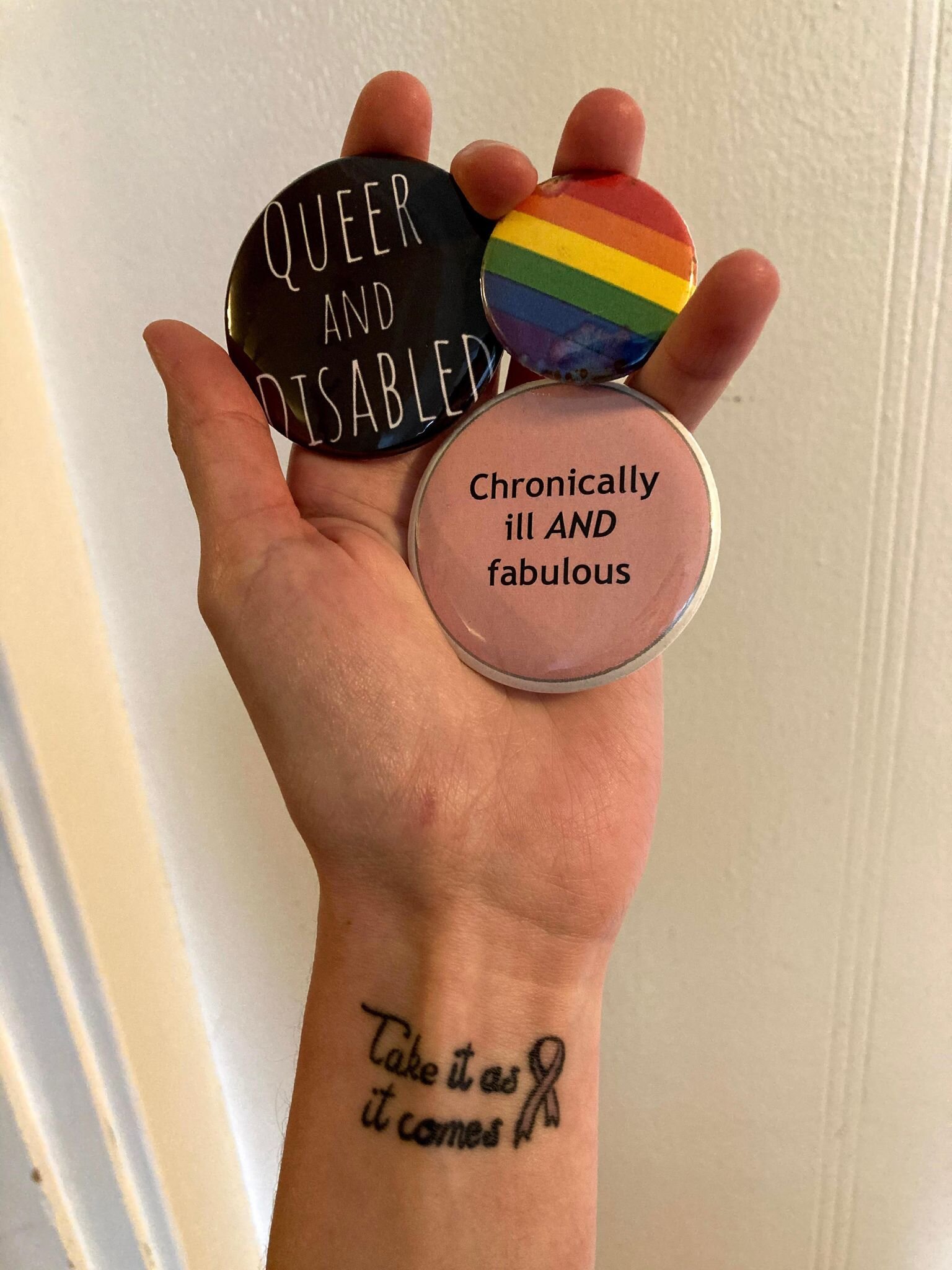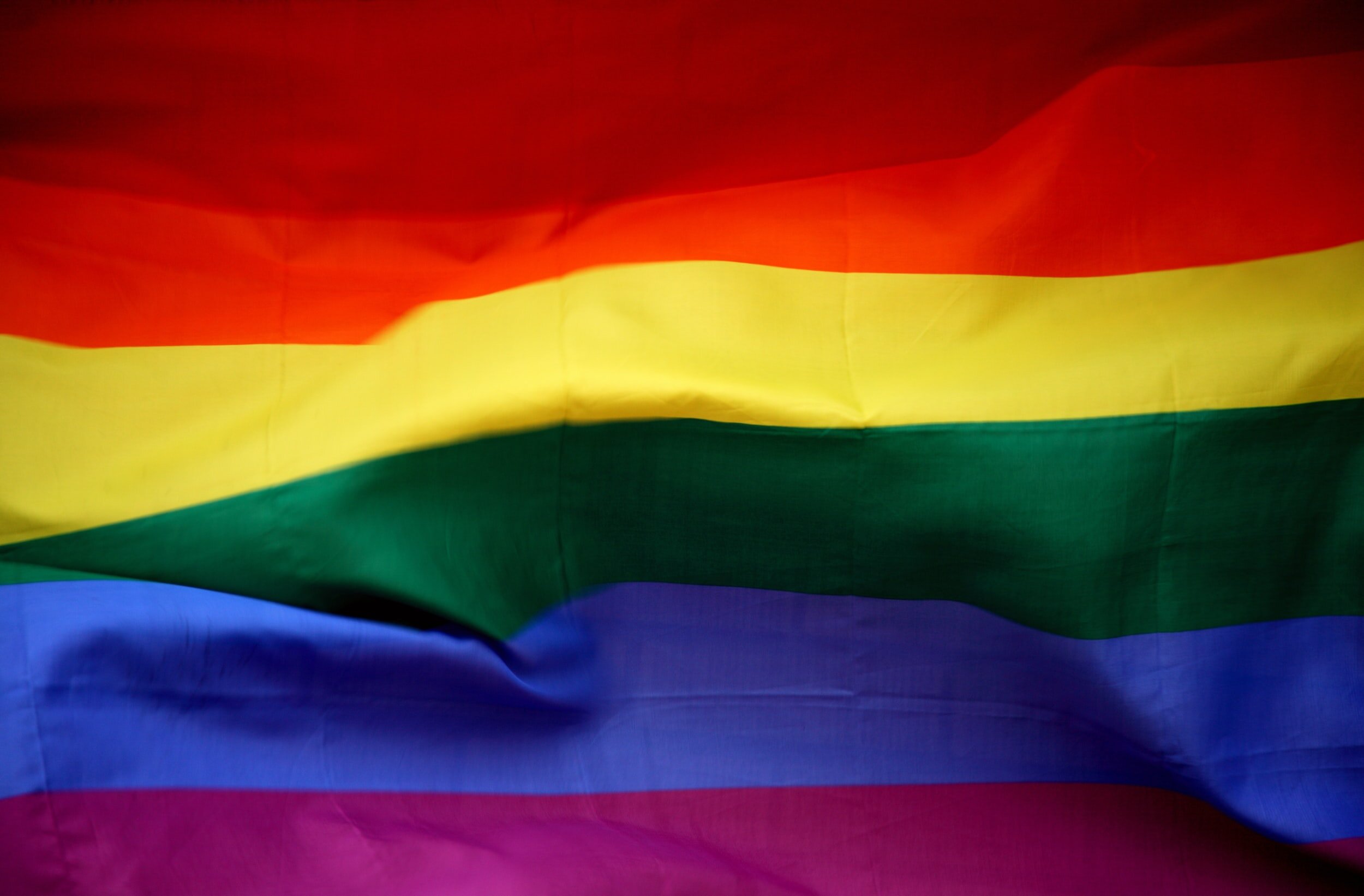Coping | Daily Life | IBD

Image of Lizzie holding pins that say; “Queer and Disabled,” “Chronically Ill and Fabulous,” and the pride flag
This is the blog I was never going to write. “Who am I to write about being queer and living with Crohn’s?” I kept asking myself. There are certainly far better LGBTQ+ advocates in the IBD community, people who are confident, showing us excellent examples of positivity and joy.
I love reading stories about out and proud members of the LGBTQ+ and IBD community. But I have wanted representation of what it’s like to try to come into your queer identity while simultaneously grappling with lifelong chronic illness diagnoses. I have wanted stories that talk about how scary it can be to be queer and chronically ill. Where were those stories? Sometimes, you have to write the blog you most needed for yourself.
I never admitted to myself the possibility I might be queer until the tail end of my college years. Eventually, I saw a decade’s worth of clues that I was queer all along but I just couldn’t admit it to myself. I already felt like an odd duck growing up, and the barrage of mockery and disgust towards LGBTQ+ folks that I heard from friends, community members, school staff, classmates, etc taught me to become a smaller version of myself if I wanted to be left alone in peace.
I am fortunate that I have always known my family and loved ones would be accepting (and to have had some accepting friends in high school and then even more in college). And I am sure that some of the people who made homophobic remarks when I was growing up have changed their views. But, I still hear those remarks in my head every time I think about coming out. “What if I come out and then get so sick I have to move back with my parents? Will people in my hometown give me dirty looks in the supermarket?” I tell myself that I am being ridiculous. But then I remember a classmate whose parent, well known and respected in the community, punished them for questioning their sexuality when we were fourteen. I remember being home alone one afternoon when I was thirteen in 2008, and my brother’s first grade teacher coming to the door with pamphlets on an upcoming ballot measure advocating for “traditional marriage,” admonishing “gay sinners.” I remember story after story like this, and I stay quiet.

By Sharon McCutcheon on Unsplash. Photo of a pride flag.
Even now, living in Portland, I am cautious. It took me almost six months to come out to my current therapist. “Are you going to put this in my medical record?” I remember asking him. “I don’t want all of the providers with power over my medical care to see this.” In many states, it was legal to deny healthcare and discriminate against LGBTQ+ folks in medical settings up until very recently.
Though I have legal protections in Oregon, most of us with IBD know that maintaining and developing a strong rapport with every single member of your medical team is essential in getting the care you need. Doing anything that might disrupt those relationships can feel like an overwhelming risk. Moreover, being a “complex” patient with several other physical illnesses and a handful of mental illnesses along with my IBD already makes me feel like some sort of rare zoo creature. Providers have sometimes said, “Whoa, I have never seen all of those conditions in one person before.” I have often worried that sharing my queer identity with providers will make me seem like even more of an “unusual” case study.
So why am I writing this blog, then? I have learned that being cautious and quiet is the way to be safe. But I am tired of being quiet. In the last three years, my IBD and other illnesses have caused me endless pain, sickness, and vulnerability. My IBD has taught me that, no matter what I do, safety will never be guaranteed. Being an immunocompromised person in a deadly pandemic has taught me that life is fragile and fighting to be an authentic version of yourself in the time you have on this earth is a worthwhile battle. With illnesses and treatments that make energy a finite resource, I am no longer willing to spend precious energy on masking my identity. That doesn’t mean that this is easy, or that I am not afraid my openness will hurt me down the road. It just means that this is a risk I am now willing to take.
To any fellow LGBTQ+ IBD patients who have experienced similar situations or fears–or worse: I am sorry. I wanted to end this blog by saying, “Everything is great now! Let’s be openly queer IBD patients together!” But the truth is, that’s not always the reality of the world in which we live. Yes, we have a growing number of allies now. Yes, legislation is turning in our favor. Yes, society has come a long way. Yes, the handful of medical professionals I’ve shared my identity with have been generally accepting. But we still have a long way to go, and the anxiety many queer chronically ill folks feel is valid.
If you are grappling with telling your medical team about your identity, I see you. If you are sitting in an IBD support group wondering if anyone else there understands what it’s like to be queer with IBD, I see you. If you were trying to make sense of your queer identity, only to have IBD derail everything in your life, I see you. If you are stuck in a home, city, or workplace that isn’t accepting because your illness is currently taking away some of your independence, I see you. If you are too sick and tired to partake in late night queer social life and wonder how you will ever find community, I see you. We may not have everything we need yet, but I can tell you this: when you are ready, the world is full of Queers With Guts waiting to love and accept you.

So beautifully stated. So brave. So authentic. I’m so always very proud of you and grateful that we shared some time together. You are a leader and this further proves it.
Hi Lizzie—I’m a GNF lesbian with an end ileostomy since 2013. I’m an old timer (late 50’s) and I can relate to your feelings thinking back to when I first came out in the ‘80s. Back then I kept a “try to pass as straight” dress in my closet for those times when it felt too risky to be open. (Not that I fooled anyone!) That dress hasn’t existed for years, and it feels exhilarating to simply be me. Yes, I’ve got DSM codes after my name, too, but our lived experience deepens our empathy and makes us stronger. I encourage you to continue to spread your wings and explore ways to express your authentic self in ways that you feel safe. Yes, things are changing, but you are right that not everyone in the country has the protections or freedom to be who they truly are, openly and proud. You took a risk writing this blog, and I applaud you! Keep up the good work and I wish you well as you continue to pursue a career as a healer and advocate.